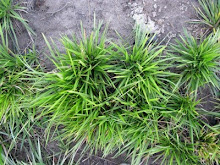
Grasses are utterly mundane and completely ubiquitous for most of us, wherever we live in the world. Yet the importance of this plant group for humanity is hard to overstate. Early grasslands in East Africa were the arena in which humans evolved, and the origins of agriculture transformed the human way of life, ultimately underpinning the development of industrial societies across the Earth. Today's grass species include most of our staple food crops - wheat, rice, maize, sorghum, sugarcane, and millets - and form the pastures on which our domesticated animals graze. They are the fuel for human civilization.
This blog is about the science and culture of grasses. It has emerged from research on grass evolution and ecology at the University of Sheffield in the UK, and is linked to an exciting new initiative to develop GrassPortal - a public web-based portal that aims to increase our understanding of the biology, ecology, geography and evolution of grasses. As well as the latest news on this project, it will explore grasses from multiple perspectives, zooming in on individual species, examining the roles of these plants in the natural world, and analyzing our close working partnership with these most crucial of species.

No comments:
Post a Comment